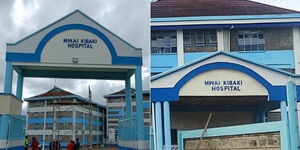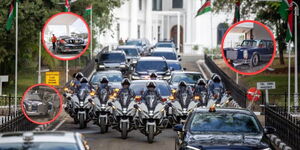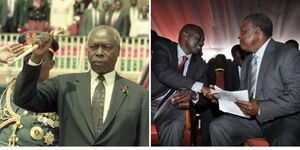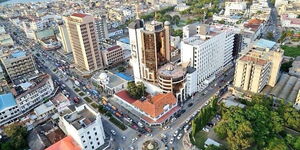As Kenya's Coronavirus tally exceeds 500 cases, with money blame games taking centre stage, and a population shying away from mass testing, other countries in Africa are easing up on lockdowns, with Uganda's President Yoweri Museveni bragging on how his country is the safest of earth.
Kenya has had its fair share of highs and lows, with Health CS Mutahi Kagwe being praised at one stage and later criticised. However, as the CS continues pleading with careless Kenyans to save their own lives, he, alongside President Uhuru Kenyatta should be taking notes on how other African countries are succeeding in curbing the disease.
Demographics and context are different, but the war is similar and the directives on prevention are too. However, what is different is the uniqueness of how the directives are adhered to and the response.
"World over, those who have delayed making the appropriate interventions against Covid-19 have paid a heavy price," Kagwe stated while addressing the media on Tuesday, May 5.
As the CS warns of Kenyans normalising the disease, with a partial lockdown in few counties, Nairobi, Kwale, Malindi, Mombasa, Uganda initiated a total lockdown on April 1, 2020, a move which Kenyatta has shied away from. Uganda recorded 97 cases and no deaths in 45 days of restriction and is now slowly lifting the lockdown.
"We have somehow tamed the virus. It is high time we start slowly and carefully open up, but without undoing our achievements," Museveni stated on Monday, May 4, as public transport, private vehicles still remained prohibited, unlike Kenya.
Another issue Museveni seems to have approached better is the contentious rent issue. As Kenyatta pleads with landlords to act on their own initiatives (on rent waivers), Museveni did not order landlords to stop collecting rent, but he stood firm on evictions, asking them to understand the situation. In Kenya, cases of tenant evictions have been on the rise. However, several legislatures such as Nairobi Senator Johnson Sakaja have tried their best to address the issue, by sponsoring bills in the Senate.
In Rwanda, one of Africa's fastest-growing nation, President Paul Kagame was the first African president to enforce a total lockdown. After 45 days, the country is slowly getting back to normal as they have so far recorded over 200 cases with no fatalities.
Most of their cases were blamed on truck drivers crisscrossing the border from Tanzania and Kenya. The two neighbouring nations are now being put on the spotlight.
Kagame launched a swift and easy free food delivery process to Rwandan households, as Kenya's food distribution and measures considered for distributing Kenyatta's Ksh10 billion to the vulnerable, raised more questions than answers.
In Cameroon, one aspect they are seemingly handling better than Kenya is quarantine and mass tests. In Kenya, citizens are running away from mass tests for fear of huge bills incurred in quarantine centres, and the stigma of forced quarantine.
Cameroon, however, has stood up for its people and has paid for quarantine. On Tuesday, May 5, Kenya's government spokesperson Cyrus Oguna stated that they were considering such a move, but the option would take more steps to be realised.
"One thing that Cameroon does right is that the government pays for quarantine measures. This is one less resistance point for people to get tested. This is unlike Kenya, where you have to pay for confinement for you and your family, discouraging testing.
"There are quarantine facilities for all infected. Recently, our minister agreed to allow some infected individuals who chose to be quarantined at home to do so. In Kenya, quarantine is mandatory for all infected and their families at their cost," Rebecca Enochong, a Cameroonian entrepreneur tweeted on May 5.
However, questions also arise on how Kenya can approach such a measure, as the love for free things in the country is untamable. Such a move would guarantee free food and shelter for 14 days and with the unemployment rate at its highest, the quarantine centres would be grappling with soaring numbers with many availing themselves out of mischief.
The Kenyan government, also played cagey with vaccine trials in the country, arguing that they were not aware of any plans to test Covid-19 in Kenya. However, several reports indicate that Kenya will be part of Covid-19 drugs and vaccine trials as she confirmed that she was approved by the World Health Organisation (WHO) to take part in clinical trials.
However, Madagascar hatched an experimental cure for Covid-19, which has excited many Kenyans but has not been fancied by the government, as Health CAS Mercy Mwangangi argued that strict Kenyan protocols called for testing of the drink dubbed Covid-Organics by Kenya Medical Research Institute (Kemri). Kemri itself has been on the spotlight for endless drama, from transfers and lack of equipment.
While Kenya strives to curb the disease, she may not have a positive lesson to learn from Tanzania, but she may, in the end, reference Tanzania's growing cases. President Pombe Magufuli has not set up stringent measures to curb the disease, but with Kenya's measures in place, the two countries are slowly witnessing a rise in Coronavirus cases.
Africa CDC, a specialised technical institution of the African Union suggests that to curb Covid-19, African governments should strengthen public health systems for immediate response and for a lasting recovery, monitor data on how public health and social measures meet local Covid-19 conditions and needs; and engage communities to adapt public health and social measures (PHSM), i.e. curfews and lockdowns, to the local context and effectively communicate about risks to sustain public support.












